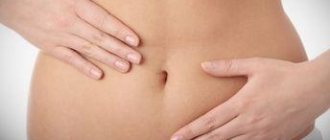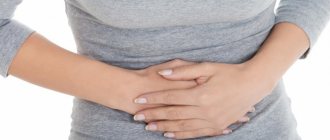Diarrhea (diarrhea) is one of the main reasons for adults to visit a doctor. Diarrhea refers to all cases of frequent (more than 3 times a day) bowel movements with the release of liquid, unformed feces. If symptoms last no more than 14 days, such diarrhea is considered acute, and malaise for more than 4 weeks is equivalent to chronic diarrhea. Every year in Russia, about 800 thousand cases of acute diarrhea due to intestinal infections are registered, and chronic diarrhea occurs on average in 7-14% of the adult population.
Different types of diarrhea and their differences
Doctors distinguish 4 types of diarrhea, and they differ not only in the mechanism of development, but also in the appearance of the stool:
- Secretory. It occurs when excess water and salts enter the intestinal lumen under the influence of bacterial toxins, disturbances in the hormonal regulation of digestion, and excessive use of laxatives. Manifested by copious watery stools without or with a small amount of impurities.
- Osmotic. It is observed with slow absorption of water, electrolytes and carbohydrates from the intestine due to insufficiency of digestive enzymes, deficiency of bile acids, anatomical and functional defects of the gastrointestinal tract. It manifests itself as copious loose stools with a fetid odor, often accompanied by steatorrhea - “fatty” feces.
- Exudative. It develops when the intestinal wall is damaged by the inflammatory process during certain intestinal infections (dysentery, salmonellosis), Crohn's disease, and ulcerative colitis. In this case, the stool will be liquid or pasty, scanty, with an abundance of mucus and blood.
- Motor. It occurs as a result of accelerated peristalsis due to impaired nervous regulation (irritable bowel syndrome), excessive secretion of hormones, and taking certain medications. During defecation, a moderate amount of liquid feces without pathological impurities is released.
The following tests are required
To accurately identify the causes of ailments, it is necessary to undergo some tests and studies.
This is necessary in order to identify possible problems in the functioning of the large intestine at an early stage. Biochemical blood test Ultrasound of the abdominal organs Gastroscopy (EGD)
Considering the increase in cancer diseases in recent years, in particular colon cancer, people over 45 years of age and earlier, if there are complaints, in our clinic you can undergo a Colonoscopy (including during sleep)
First aid measures for diarrhea
If you experience diarrhea or other signs of gastrointestinal distress, do not delay seeing a doctor. The specialist will quickly make the correct diagnosis and prescribe treatment. However, before the doctor arrives, you can alleviate your condition:
● drink more fluids (water, dried fruit compotes, strong tea) to prevent dehydration
● give up heavy fatty foods, flour, sweets, spices and herbs, fresh vegetables and fruits
● eat more starchy soft foods - porridge, stewed vegetables, mashed potatoes, unsweetened baked goods made from premium flour
● drink enterosorbents (Sorbex, Enterosgel, Polysorb, Laktofiltrum)
Nausea, constipation, heartburn, bloating during pregnancy
26.04.2021
Some of the most common complaints during pregnancy are : nausea and vomiting, heartburn and indigestion , gas and bloating , diarrhea , constipation , hemorrhoids . This happens to almost all pregnant women and should not be a cause for concern, as many causes lie in the anatomical changes in a woman's body during pregnancy .
Anatomical changes in the digestive tract are expressed in the rise of the stomach and intestines upward and to the sides as a result of elevation of the uterus . Pregnancy is associated with increased production of gastrin, which increases the volume of the stomach and the acidity of its contents. Due to increased levels of progesterone, the tone of the lower esophageal , which increases during pregnancy and returns to normal after childbirth . This creates conditions for some reflux and heartburn in 30-80% of pregnant women, and complaints about pregnancy are reduced.
Gastric emptying of solid foods is delayed, while liquid emptying is unchanged during pregnancy . Motility of the small and large intestines decreases in the second and third trimesters, again due to the relaxing effect of progesterone on smooth muscle.
Delayed intestinal passage creates conditions for better absorption of nutrients, but, on the other hand, promotes the proliferation of microorganisms and gas formation. Flatulence and bloating are common complaints during pregnancy , especially after the second trimester. To prevent this condition it is necessary:
- limit consumption of certain foods: carbonated drinks, legumes, cabbage, broccoli, wheat, milk, artificial sweeteners;
- eat slowly, calmly, often and in small portions.
Pregnant women are often prone to constipation. Insufficient intake of fluids, fruits and vegetables, decreased physical activity, low fiber foods, eating too many baked goods, fried foods are some of the common causes of constipation.
Eat more vegetables, fruits, whole grains, oat bran, legumes, prunes, and drink plenty of fluids.
Avoid dry foods such as cookies, toast and more.
A glass of warm water in the morning on an empty stomach speeds up metabolism (the combination of lemon, honey and warm water will please you even more).
Frequent walks and light exercise at home are good options for you.
In more severe cases, expectant mothers have to endure this condition until the sixth month. If you feel nauseous early in the morning, eat a piece of dry bread or crackers, this will raise your blood and the nausea will disappear. When to see a doctor ? With one or more of the following symptoms:
- general malaise and increased body temperature;
- contractions;
- vaginal discharge ;
- pain and tension in the lower abdomen ;
- bloody issues;
- upset stomach lasting more than 24 hours;
- deterioration of general condition, increased fatigue.
Is there a way to prevent some of the above mentioned unpleasant digestive symptoms during pregnancy ?
Basically yes. Here are some tips that may be helpful.
- Have breakfast immediately after waking up.
- Eat often and in small portions (5-6 times a day).
- Avoid prolonged fasting.
- Limit your consumption of irritating foods (fried, fatty, spicy, with a lot of spices).
- Don't eat before bed.
- Avoid alcohol and smoking.
- Choose the food you eat carefully.
- Choose the appropriate cooking method: boiled, stewed or baked.
- Get enough fluids and fiber (especially if you suffer from frequent vomiting).
If you can't eat anything else, eat boiled or stewed potatoes - they calm the stomach .
Published in Pregnancy and pregnancy management Premium Clinic
When to call an ambulance
Diarrhea can be severe or be the first sign of serious gastroenterological or surgical pathology. To avoid complications, the patient is advised to seek emergency care.
Signs of deterioration:
● repeated vomiting that does not bring relief
● frequent and copious stools, accompanied by dehydration
● an increase in temperature over 39°C and no effect from standard antipyretic tablets
● the appearance of blood or pus in the stool
● impaired consciousness
When you need to see a doctor urgently
Abdominal pain with diarrhea should always be a concern. Short-term bowel dysfunction occurs in many acute diseases that require surgical care3, for example, in the first stage of intestinal obstruction, biliary colic or appendicitis3.
You should consult a doctor urgently if:
- severe stomach pain and diarrhea;
- fever, chills appeared, general condition continued to deteriorate;
- pain is accompanied by tension in the anterior abdominal wall;
- vomiting is frequent and does not bring relief;
- stool contains scarlet blood or is black in color;
- the loss of fluid with liquid feces cannot be compensated for independently by stool due to incessant vomiting and diarrhea, the stomach hurts and it is not clear what to do;
- signs of dehydration are observed: dry mucous membranes and coating on the tongue, sunken eyes, pallor and grayish skin tone, confusion, lack of urination;
- diarrhea and abdominal pain occurred in a small child, a pregnant woman, an elderly person or a person weakened by illness.
Up to contents
Causes of poisoning
Sources of drinking water are located close to the soil surface. Therefore, there is a possibility of infection by pathogenic bacteria - Vibrio cholerae, E. coli, etc. A humid environment is favorable for them. Water filtration and sedimentation with chlorine treatment are designed to prevent infection of people. If preventive measures and water quality control are insufficient, bacteria will enter the body with what flows from the tap. Their reproduction causes disease and intoxication with characteristic symptoms.
Poisoning of people with water also occurs when it contains heavy metals, poisons, and fertilizers. This happens especially often when consuming the contents of wells, which have not been properly tested and may be contaminated even if there is no unpleasant aftertaste. Some microelements contained in water aggravate the condition when they are overabundant in the body. For example, exceeding permissible doses of selenium often causes acute poisoning or the development of chronic poisoning with this component. It is worth noting that this trace element is also found in food products, so water alone cannot be blamed for intoxication.
Boiling is a good way to get rid of hardness salts, bacteria, and viruses. When boiling, harmful substances and microorganisms cannot withstand high temperatures, and salts precipitate. However, poisoning from boiled water is possible. It is associated with the possible content of petroleum products, pesticides, and industrial emissions, which are not afraid of high temperatures. Drinking liquids with such substances will not lead to acute intoxication - contaminants accumulate in the body gradually, becoming a source of chronic diseases. The same can be said about cyanobacterial toxins, the proportion of which can be exceeded: they pose a danger by destroying liver cells.
Diagnostics
Depending on the intensity of the pain and accompanying symptoms, the patient may be examined by a surgeon, gastroenterologist, or infectious disease specialist. The doctor begins by collecting complaints and medical history, then conducts a physical examination and checks for symptoms of peritoneal irritation. To establish the cause of diffuse abdominal pain, the following laboratory and instrumental techniques are prescribed:
- Ultrasound.
Ultrasound examination of the abdominal cavity reveals a thickened and edematous intestinal wall, and sometimes peritoneal effusion is found. Duplex scanning is used to assess blood flow in the mesenteric vessels, diagnose vascular thrombosis and intestinal infarction. - Radiography
. Plain radiography is informative for confirming intestinal obstruction based on the characteristic Kloiber cups and intestinal arches. For chronic pain throughout the abdomen, it is possible to perform irrigoscopy, X-ray of the gastrointestinal tract with oral contrast to examine the intestinal mucosa. - Diagnostic laparoscopy.
If the etiology of abdominal syndrome is unclear, a visual examination of the abdominal cavity is performed through a laparoscope. The doctor detects changes in the color and vascular pattern of the intestinal wall, and identifies purulent, fecal or serous effusion. - Laboratory methods
. To exclude enzyme deficiency and inflammatory bowel diseases, a coprogram is recommended. To confirm the diagnosis of intestinal infections or SIBO, bacteriological culture of stool is done. Blood tests include a hemogram, analysis of glucose levels, urea and creatinine levels.
In practical gastroenterology, intestinoscopy is used - the “gold standard” for diagnosing SIBO. The diagnosis can be made if culture of the contents of the small intestine reveals the growth of opportunistic microflora in an amount of more than 105 CFU. If vascular pathology is suspected, CT angiography of mesenteric vessels and aortography are performed. To detect tumor processes, CT and MRI of the abdominal organs are indicated.
Palpation of the abdomen
How to help digestion?
To compensate for the lack of digestive enzymes of the pancreas, pancreatin enzyme preparations can be used. They help improve food digestion. Helping with fat digestion is especially important. The required enzyme for this is lipase, which is produced only by the pancreas. At other stages of digestion, except for the intestines, it is simply not there2. Therefore, when choosing an enzyme preparation, its quantity is so important. How to figure it out?
The most common and familiar drug for improving digestion is pancreatin in tablet form3. Pancreatin is the active ingredient of an enzyme preparation to improve digestion, but this does not mean that pancreatin preparations are all the same.
Since we started with the lipase content in the drug, it is worth noting that tablet forms of pancreatin can contain from 25 units (IU) of lipase. There are a number of drugs in which this amount may be higher: 3500–4500 IU of lipase. The optimal amount of lipase that should be contained in an enzyme preparation in case of dietary errors is recognized to be 10,000 units4.
But the most important thing in choosing a drug is not even the amount of lipase. The defining property is the release form5,6.
Studying the necessary conditions for the effective operation of the enzyme preparation, scientists came to the conclusion: the preparation must have small particles of the active substance. And the size of these particles should not exceed 2 mm5,6.
The tablet form is recognized as the least effective for an enzyme preparation, since it does not allow the drug to work physiologically6,7, which means to precisely integrate into an already working system and get to where the enzymes work in natural conditions.
Easy to say, hard to do
Even when trying to stick to a regular diet, we use ready-made foods, fast food, and confectionery.
It turns out that seemingly healthy food hides an excess of fats, preservatives, sugar and other food additives. The amount of fiber, proteins, and slow carbohydrates leaves much to be desired. This may not have the best effect on digestion. If we haven’t eaten well during the day, in the evening we want to reward ourselves for our hard work and have a little belly celebration. Since childhood, we were taught to finish everything. Now this can lead to stomach discomfort after eating. It's good if this happened a few hours before bedtime. But if overeating occurs before bed, not only the evening can be ruined. Heaviness in the stomach after eating can interfere with sleep, and in the morning you get up with a “brick” in your stomach and a “cast iron” head.
We start watching our diet, vowing to ourselves to eat right, but only from Monday, and tomorrow we will have a birthday feast or a party with friends. Well, how can I refuse here?
Unfulfilled promises are forgotten, and abdominal discomfort, bloating, flatulence and other problems can haunt us constantly. Many try not to notice this or simply say that their stomach is naughty.
Tension of muscles and ligaments
Developing in the uterine cavity, the fetus enlarges and stretches its walls. This process is accompanied by stretching of the ligaments that stabilize the position of the uterus. Both the uterus and its ligaments are adapted to such stretching, but pregnant women may experience discomfort, even pain, against this background. In order not to confuse such pains with pathological ones, you need to pay attention to their frequency and duration. The pain is accompanied by micro-tears of the connective tissue of the ligaments, which normally last no more than five minutes. If the pain does not go away longer, then this is a reason to doubt that it is caused by a sprain.
In late pregnancy, the muscles surrounding the peritoneum (oblique and rectus abdominis) also experience tension. There may be tingling pain when changing posture. They pass as quickly as they arise.









